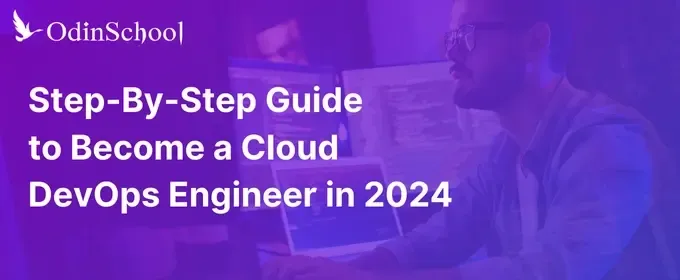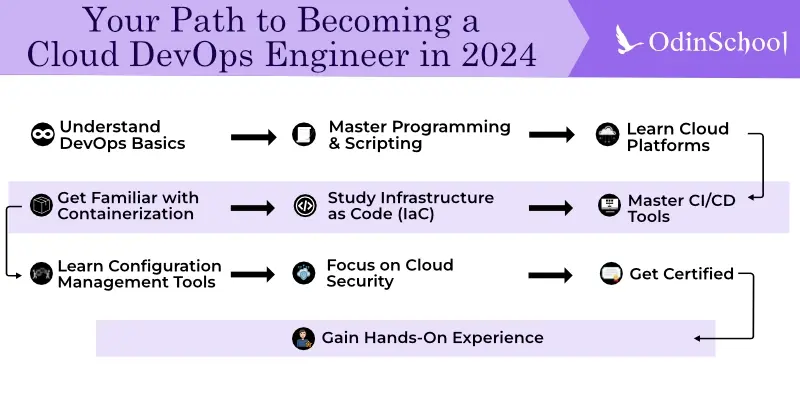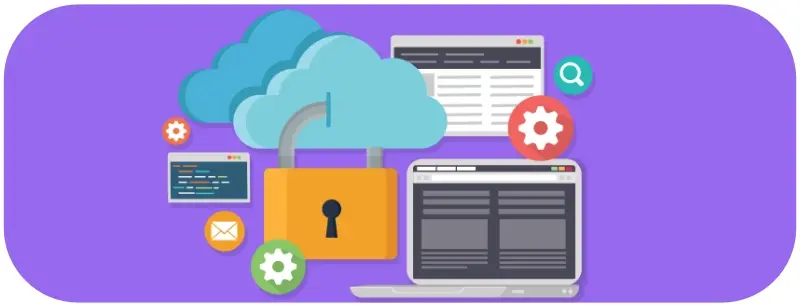Step-by-Step Guide to Become a Cloud DevOps Engineer in 2024

In this guide, we’ll take you step by step through what it takes to break into the role of a Cloud DevOps Engineer—from getting a handle on the basics to mastering the tools and earning the right certifications to help you stand out in this competitive field.
The tech world is changing at lightning speed, and if you’re looking for a career that’s right at the heart of this revolution, then becoming a Cloud DevOps Engineer might just be your golden ticket! Think of it as the ultimate blend of development, operations, and cloud technology – the dream team for today’s tech industry.
With businesses racing to the cloud, there’s a huge demand for people who can bridge the gap between creating software and making sure it runs like a well-oiled machine in the cloud. Whether you’re an experienced IT professional wanting to shift gears or someone just stepping into the tech space, Cloud DevOps Engineer is one of the most exciting, in-demand, and rewarding roles out there right now.
So, let's dive right in!
What is DevOps?
.webp)
What is DevOps?
DevOps is a combination of "Development" and "Operations." It refers to a set of practices and cultural philosophies that aims to bridge the gap between software development teams and IT operations. Traditionally, these teams operated in silos, leading to longer development cycles, poor communication, and inefficiencies.
The core idea behind DevOps is automation, continuous integration, and continuous delivery (CI/CD) to ensure that software updates can be rolled out more frequently and reliably. It integrates tools and processes to help teams work together, enabling rapid development and deployment of high-quality software.
In essence, DevOps fosters collaboration, improves agility, and accelerates innovation within an organization.
What is a DevOps Engineer?
.webp)
A DevOps Engineer is a professional who works at the intersection of development and operations, helping to automate processes, manage infrastructure, and ensure smooth software deployment. The role demands proficiency in both software development and system administration, requiring a strong understanding of coding, scripting, cloud platforms, and IT infrastructure.
While the title "DevOps Engineer" is relatively new, the skill set has been evolving over the past decade. DevOps engineers are often tasked with:
1. Setting up CI/CD pipelines to automate software testing and deployment.
2. Monitoring system performance and troubleshooting issues.
3. Implementing automation tools to reduce manual labor in IT operations.
4. Collaborating with development teams to ensure that software is production-ready.
5. Managing cloud infrastructure, ensuring scalability, reliability, and security.
DevOps engineers essentially serve as the glue between software development and operational teams, streamlining processes and improving efficiency.
Why Cloud DevOps is the Future?
94% of companies across the globe are already using cloud computing. Cloud DevOps is the natural evolution of traditional DevOps practices, integrating cloud computing into the DevOps methodology.
The cloud offers several advantages:
1. Scalability: Cloud platforms allow you to easily scale infrastructure up or down based on demand.
2. Cost Efficiency: Cloud resources are billed based on usage, making it cost-effective for businesses of all sizes.
3. Automation: Cloud providers offer robust automation tools, which align perfectly with DevOps practices.
4. Global Reach: With cloud solutions, companies can deploy applications globally with ease, ensuring low-latency access for users around the world.
This shift has given rise to the role of the Cloud DevOps Engineer, a professional who combines the principles of DevOps with cloud platform expertise. Cloud DevOps engineers focus on automating cloud infrastructure, managing cloud-native applications, and optimizing cloud resource usage.
Step-by-Step Guide to Becoming a Cloud DevOps Engineer

1. Understand the Basics of DevOps
Before diving into the cloud aspect, you must have a solid grasp of what DevOps is and the role it plays in software development and IT operations. Familiarize yourself with key DevOps concepts such as:
- Continuous Integration/Continuous Delivery (CI/CD): Learn how CI/CD pipelines help automate code integration, testing, and deployment.
- Version Control: Tools like Git are essential for managing code changes in a collaborative environment.
- Infrastructure as Code (IaC): This involves managing and provisioning infrastructure using code rather than manual processes.
Reading books, watching tutorials, or taking introductory courses in DevOps can help lay a strong foundation.
2. Master Scripting and Programming Languages
As a DevOps engineer, you will need to automate tasks and build tools to streamline workflows. This requires proficiency in scripting languages such as:
- Python: Widely used for automation and writing scripts.
- Bash: Essential for Unix-based systems like Linux.
- PowerShell: Useful if you work in a Windows environment.
Additionally, a good understanding of popular programming languages like Java, Go, or Ruby can be beneficial when working on software integration or troubleshooting.
3. Learn Cloud Platforms (AWS, Azure, Google Cloud)
To become a Cloud DevOps Engineer, it’s imperative to have a strong command over cloud platforms. The top three cloud providers today are:
- Amazon Web Services (AWS)
- Microsoft Azure
- Google Cloud Platform (GCP)
Each of these platforms offers unique services and tools that are integral to cloud DevOps. You don’t need to master all three, but expertise in at least one is essential.
For AWS, focus on services like EC2 (Elastic Compute Cloud), S3 (Simple Storage Service), RDS (Relational Database Service), and Lambda for serverless computing.
For Azure, focus on Azure Virtual Machines, Azure DevOps, and Azure Kubernetes Service (AKS).
For GCP, get familiar with Compute Engine, Cloud Functions, and Google Kubernetes Engine (GKE).
4. Get Familiar with Containerization and Orchestration (Docker & Kubernetes)
Containers have revolutionized software development and deployment. By using containers, developers can package an application and its dependencies into a single unit that can run consistently across different computing environments.
- Docker is the most popular containerization tool. Learning how to build, manage, and deploy Docker containers is crucial.
- Kubernetes is a container orchestration platform that automates the deployment, scaling, and management of containerized applications. As a Cloud DevOps Engineer, you will likely work with Kubernetes to manage containers in a cloud environment.
5. Learn Infrastructure as Code (IaC)
Infrastructure as Code (IaC) is a key DevOps practice where cloud infrastructure is managed through code. This eliminates the need for manual configuration and allows for consistent and repeatable setups.
- Terraform is one of the most popular IaC tools and is cloud-agnostic, meaning you can use it to manage infrastructure across AWS, Azure, and GCP.
- AWS Cloud Formation is specific to AWS and helps in automating resource provisioning and configuration.
Learning how to define cloud infrastructure as code will help you manage large-scale systems efficiently and ensure that infrastructure changes can be rolled out reliably.
6. Understand CI/CD Tools (Jenkins, GitLab, CircleCI)

Setting up and managing CI/CD pipelines is a core responsibility of a Cloud DevOps Engineer. These pipelines help automate the software release process, from code integration to testing and deployment.
Some of the popular CI/CD tools you should learn include:
- Jenkins: Open-source automation server used to set up CI/CD pipelines.
- GitLab CI: Integrated with GitLab for seamless version control and CI/CD management.
- CircleCI: A cloud-native CI/CD tool known for its simplicity and scalability.
7. Master Configuration Management Tools (Ansible, Puppet, Chef)
Configuration management tools are used to manage and automate system configurations, helping DevOps engineers maintain consistency across multiple environments. Popular tools include:
- Ansible: Simple to use and highly efficient for automating repetitive tasks like server configurations and application deployments.
- Puppet: Useful for managing the configuration of large-scale systems.
- Chef: Also used for automating server setup and maintenance.
Mastering these tools will ensure that your deployments are consistent, reducing the risk of errors.
8. Focus on Cloud Security

As cloud platforms are increasingly targeted by cyber-attacks, security is paramount. You need to understand cloud-specific security challenges and how to mitigate them. Learn about:
- Identity and Access Management (IAM): Controlling access to cloud resources.
- Encryption: Ensuring data security both at rest and in transit.
- Vulnerability Management: Regularly scanning and patching vulnerabilities in cloud infrastructure.
9. Earn Relevant DevOps and Cloud Computing Certifications
Certifications can help validate your skills and make you stand out to potential employers. To become a Cloud DevOps Engineer in 2024, you can accelerate your journey by enrolling in our DevOps and Cloud Computing Course. This 6-month program offers a comprehensive curriculum designed to equip you with the essential skills required in this dynamic field. Here’s what makes our course stand out:
- Advanced Certification from E&ICT Academy, IIT Guwahati: Gain a prestigious certification that is recognized and respected across industries.
- Live Online Classes: Learn from industry experts and instructors in real-time, ensuring an interactive and engaging learning experience.
- 2-Day Campus Immersion Program at IIT Guwahati: Get hands-on experience with an immersive on-campus session, allowing you to network and learn in a real-world environment.
- Alumni status at E&ICT Academy, IIT Guwahati: Become part of an elite network of professionals by gaining alumni status at one of India’s leading institutions.
This course is ideal for individuals looking to develop a strong foundation in DevOps and Cloud Computing while earning a certification from one of the most prestigious technical institutes in the country. Whether you're a beginner or an experienced IT professional, this program will help you stay ahead in the evolving tech landscape.
10. Gain Hands-On Experience

Theoretical knowledge alone isn’t enough to succeed as a Cloud DevOps Engineer. You need real-world experience. Start by:
- Working on personal projects: Set up a cloud-based CI/CD pipeline or create an infrastructure using Terraform.
- Contributing to open-source projects: This is a great way to gain hands-on experience and collaborate with the DevOps community.
- Internships or freelance work: Apply for internships or freelancing gigs where you can work on live projects.
Final Thoughts
Becoming a Cloud DevOps Engineer in 2024 is a promising career path that offers a blend of technical challenge, innovation, and lucrative opportunities. As more organizations move to the cloud, professionals skilled in both DevOps and cloud technologies will be in high demand.
By following this step-by-step guide and continuously updating your skills, you can build a strong foundation and stay ahead in this ever-evolving field. Whether it’s mastering cloud platforms, automating infrastructure, or ensuring secure deployments, the role of a Cloud DevOps Engineer is as dynamic as it is rewarding.
Frequently Asked Questions
1. What is the role of a Cloud DevOps Engineer?
A Cloud DevOps Engineer combines the principles of DevOps with cloud computing expertise to automate and manage cloud infrastructure. They handle continuous integration/continuous delivery (CI/CD) pipelines, container orchestration, cloud security, and infrastructure as code to ensure smooth software development and deployment in cloud environments.
2. What skills are essential to become a Cloud DevOps Engineer?
Key skills include proficiency in scripting languages (Python, Bash), cloud platforms (AWS, Azure, Google Cloud), containerization tools (Docker, Kubernetes), CI/CD tools (Jenkins, GitLab), Infrastructure as Code (Terraform), and cloud security best practices.
3. Do I need to know coding to become a Cloud DevOps Engineer?
Yes, knowledge of coding and scripting is essential. You should be familiar with languages like Python, Bash, and PowerShell, as well as the ability to automate processes and write scripts for infrastructure management.
4. How important are certifications for a Cloud DevOps Engineer?
Certifications are highly valuable for validating your skills and standing out in the job market. Certifications such as AWS Certified DevOps Engineer, Azure DevOps Engineer Expert, Google Cloud Professional DevOps Engineer or from a reputable institute like IIT Guwahati are recognized by employers and can significantly enhance your employability.
5. How can I gain hands-on experience in Cloud DevOps?
Start by working on personal projects, setting up CI/CD pipelines, and managing cloud infrastructure using tools like Docker, Terraform, and Kubernetes. Contributing to open-source projects and seeking internships or freelance work can also provide practical experience.